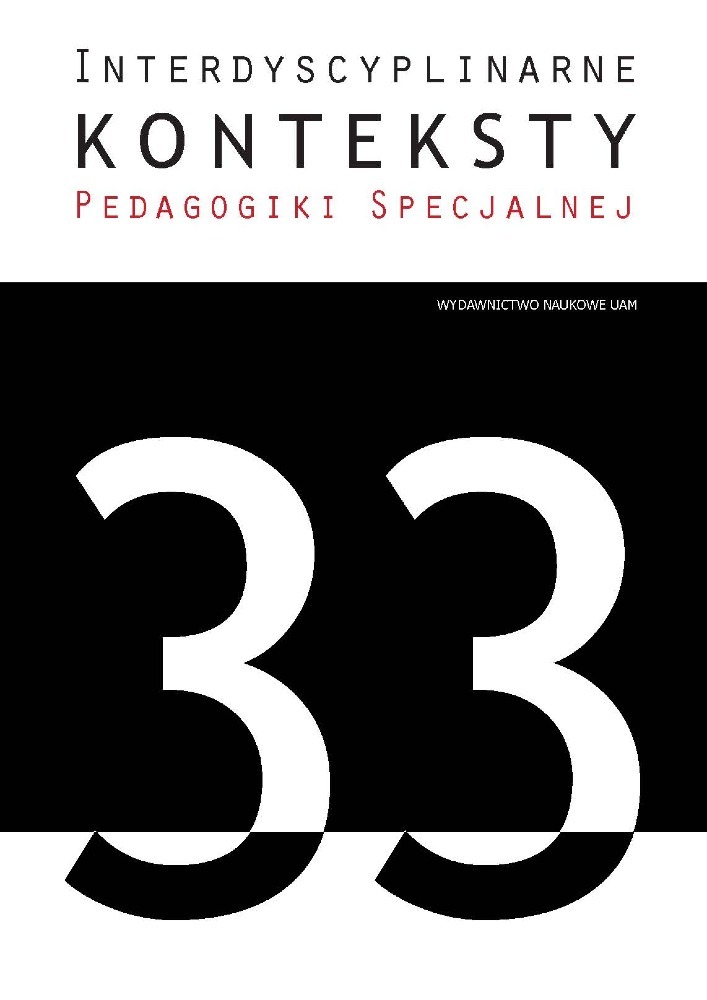Abstract
Most parents of children with disabilities still do not know what support they can expect in the situation in which they have found themselves, and where and to whom they can turn for such support. Knowledge on this subject by medical, educational and local government employees is non-complex and does not create a coherent system, and therefore does not meet the expectations and needs of the parents. Assessment of the support obtained by individual groups, as well as access to suport systems and legal, financial and psychological assistance in the rehabilitation of a child in the organization of free time, is very diverse, which proves the ineffective functioning of information on such support and assistance systems. The aim of the conducted research was to what support was given to parents of children with disabilities and whether it is relevant to their needs and expectations. The research used a quantitative and qualitative strategy. The research used the method of diagnostic survey was used, in which a questionnaire and a focus group interview were conducted. The results show that according to the parents of children with disabilities still do not receive adequate support in Poland in the situation in which they have found themselves. A coherent system should be created for the management of an integrated package of services to support families raising a child (children) with disabilities. This system, based on medical, educational and territorial employees, should provide comprehensive and effective access to information about the forms of support and assistance available to such families.
References
Barretto C., Byrne C., Delaney M., Harrington A., Kazokova K. (2017). Supports for parents of children with an intellectual disability. The social care workers view, „Journal of Social Care”, 1, 6.
Bilewicz M. (2018). Wsparcie informacyjne rodziców w momencie otrzymania diagnozy o niepełnosprawności dziecka, „Niepełnosprawność. Dyskursy Pedagogiki Specjalnej”, 30, s. 150–162.
Bishop S.L., Richler J., Cain A.C., Lord C. (2007). Predictors of perceived negative impact in mothers of children with autism spectrum disorder, „American Journal on Mental Retardation”, 112.
Broberg M. (2011). Expectations of and reactions to disability and normality experienced by parents of children with intellectual disability in Sweden, „Child Care, Health and Development”, 37 (3), s. 410–417.
Burton-Smith R., Mcvilly K.R., Yazbeck M., Parmenter T.R., Tsutsui T. (2009). Service and support needs of Australian carers supporting a family member with disability at home, „Journal of Intellectual and Developmental Disability”, 34 (3), s. 239–247.
Gascoigne E. (2012). Working with Parents: As Partners in Special Educational Needs, New York: Routledge.
Gładyszewska-Cylulko J. (2016). Relacja rodzic–specjalista w kontekście psychologicznych następstw błędów popełnianych podczas informowania rodziców o wykryciu zaburzeń rozwoju dziecka, „Psychiatria i Psychologia Kliniczna”, 16 (4), s. 256–261.
Graungaard A.H., Skov L. (2007). Why do we need a diagnosis? A qualitative study of parents’ experiences, coping and needs, when the newborn child is severely disabled, „Child Care Health Development”, 33, s. 296–307.
Hasnat M.J., Graves P. (2000). Disclosure of developmental disability: A study of parent satisfaction and the determinants of satisfaction, „Journal of Pediatrics and Child Health”, 36, s. 29–35.
Janion E. (2007). Dziecko przewlekle chore w rodzinie, Zielona Góra: Oficyna Wydawnicza Uniwersytetu Zielonogórskiego.
Janocha W. (2009). Rodzina z osobą niepełnosprawną w społecznym systemie wsparcia, Kielce: Wydawnictwo Jedność.
Jazłowska A., Przybyła-Basista H. (2019). Doświadczanie stresu i odnajdywanie pozytywnych aspektów rodzicielstwa w kontekście wychowywania dziecka z niepełnosprawnością intelektualną, „Dziecko Krzywdzone. Teoria, Badania, Praktyka , 18, 2, s. 76–105.
Kwaśniewska G., Wojnarska A. (2004). Pomoc rodzinie dziecka niepełnosprawnego – wybrane kierunki oddziaływań, w: Aktualne problemy wsparcia społecznego osób niepełnosprawnych, red. G. Kwaśniewska, A. Wojnarska, Lublin: Wydawnictwo UMCS, s. 180–195.
Lipińska-Lokś J. (2014). Wsparcie rodziców dzieci z niepełnosprawnością w środowisku szkolnym: zielonogórski przykład dobrych praktyk, „Problemy Edukacji, Rehabilitacji i Socjalizacji Osób Niepełnosprawnych”, 18/1, s. 123–136.
Nissenbauma M.S., Tollefsona N., Reese R.M. (2002). The interpretative conference. Sharing a diagnosis of autism with families, „Focus on Autism and Other Developmental Disabilities”, 17, s. 30–43.
Olsson I., Roll-Pettersson L. (2012). No no, you cannot say that! Perceptions and experiences of parents of preschool children with intellectual disabilities in Sweden, „European Journal of Special Needs Education”, 27 (1), s. 69–80.
Pisula E. (2007). Rodzice i rodzeństwo dzieci z zaburzeniami rozwoju, Warszawa: Wydawnictwa Uniwersytetu Warszawskiego.
Sęk H., Cieślak R. (2004). Wsparcie społeczne – sposoby definiowania, rodzaje i źródła wsparcia, wybrane koncepcje teoretyczne, w: Wsparcie społeczne, stres i zdrowie, red. H. Sęk, R. Cieślak, Warszawa: PWN, s. 11–28.
Siklos S., Kerns K.A. (2006). Assessing need for social support in parents of children with autism and Down syndrome, „Journal of Autism and Developmental Disorders”, 36, s. 921–933.
Syeda M., Weiss J.A., Lunsky Y. (2011). Experiences of families of individuals with intellectual disability and psychiatric disorder, „Journal on Developmental Disabilities”, 17 (2), s. 64–68.
Taanila A. (2002). Well-presented first information supports parents ability to cope with a chronically ill or disabled child, „Acta Paediatrica”, 91, 12, s. 1289–1291.
Wołosiuk B. (2011). Pomoc rodzinie dziecka o specjalnych potrzebach edukacyjnych, w: Specjalne potrzeby niepełnosprawnych, red. M. Białas, Kraków: Wydawnictwo Arson, s. 51–61.
Yamaoka Y., Tamiya N., Izumida N., Kawamura A., Takahashi H., Noguchi H. (2016). The relationship between raising a child with a disability and the mental health of others compared to raising a child without disability in Japan, „SSM – Population Health”, 2, s. 542–548.
Żyta A., Ćwirynkało K. (2015). Wspieranie rodzin dzieci z niepełnosprawnością – perspektywy zmiany, „Wychowanie w Rodzinie”, 111, 1, s. 377–396.

